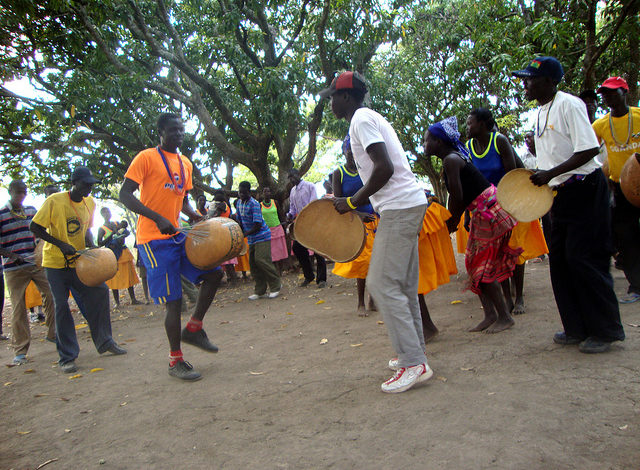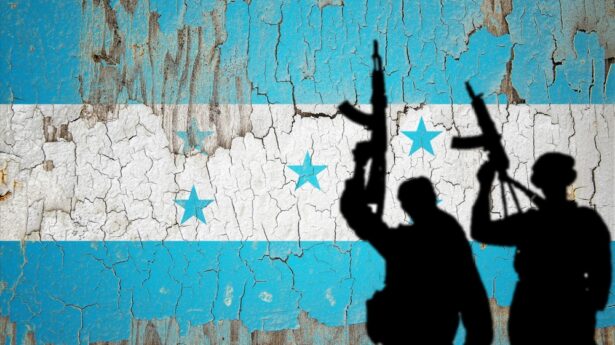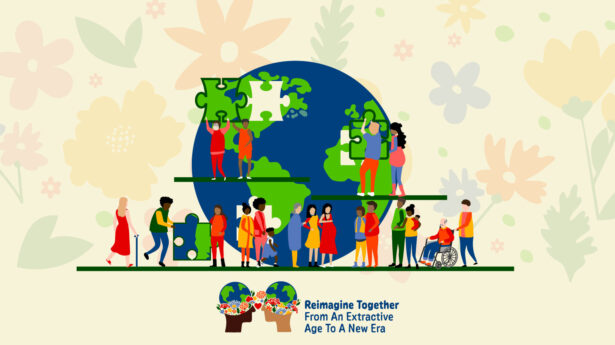The Unitarian Universalist Service Committee advances human rights through grassroots collaborations.
You Can Go Home Again

April 2, 2010
UUSC’s Eye-to-Eye Approach in Northern Uganda
We all want a place to call home; the desire is universal. In northern Uganda, more than 1.8 million people have been displaced from their homes for more than 22 years. Targeted by both sides in the brutal war between the Lord’s Resistance Army and the Ugandan government, the Acholi people have been subject to extreme violence and forced to live in camps for internally displaced persons (IDPs).
Thousands have been killed; homes, roads, and services have been destroyed; and the very fabric of Acholi culture has been torn. In 2007, however, relative peace arrived in the area after years of atrocities. Families yearned — and finally had the opportunity — to return to their villages, but they faced huge obstacles in doing so. Over the past several years, UUSC has been using its unique eye-to-eye partnership model to help more than 6,000 people return to their villages in an integrated, sustainable way.
It starts with listening
When UUSC first began work in the Pader district — the most neglected and dangerous area during the war — in 2008, it sought out a local nongovernmental organization (NGO) that would understand the culture and history of the Acholi people. Caritas Pader, staffed completely by Acholi and dedicated to working with marginalized populations, was a natural partner. UUSC hired Jackie Okanga, a Kenyan with experience working for the Office of the United Nations High Commissioner for Refugees (UNHCR) in Somalia, as a team leader to coordinate UUSC’s work with Caritas Pader and the Acholi people living in two IDP camps, Acuru and Amoko Lagui.
On a recent visit to the United States, Okanga related to UUSC that many NGOs go into an area of humanitarian crisis assuming they know exactly what a given population needs. When UUSC started working with people in the IDP camps, Okanga shared, “No one had been asking questions. It starts with listening, with not having a preconceived idea of what you think a community needs.” People told her, “All the time people come and don’t listen to us.” Sometimes what a community needs isn’t obvious. People need food, water, and shelter — but for the Acholi to truly and sustainably return home they needed more than that.
They needed support combined with empowerment. While many international-aid NGOs view certain populations — the elderly, young, widows — as “extremely vulnerable individuals” (EVIs), UUSC prefers the term “extremely capable individuals” (ECIs). Challenging the culture of dependency that aid in the IDP camps encouraged, they told people, “We are here to work with you on going home.”
Psychological and practical needs
As Okanga and the Caritas team listened, they found, not surprisingly, that there were major psychological and cultural issues to address before people could resettle into their villages. “They needed to bury the dead and bury the memories — but how do you do that?” said Okanga. Through a holistic approach to healing, Okanga and her team helped the Acholi carry out traditional cleansing and reconciliation ceremonies, arrange for one-on-one counseling for dealing with the trauma of war, and organize memorial services for the dead.
On the practical side, the Acholi needed houses, water, oxen and other agricultural resources so they could feed and support themselves, as well as access to education. To recommence farming, a “community solution” was established in which eight families collectively own and care for a team of oxen, youth take responsibility for plowing the fields, and then they are able to use the team to generate income plowing fields in other villages. With training from the Massachusetts Institute of Technology D-Lab, villagers began to use technologies to ease work burden and generate income — like creating biomass charcoal from agricultural waste — and bolster their creative capacity for solving problems.
Reclaiming culture and community
For the Acholi, who have a rich cultural tradition of dance and song, traditional dance costumes and musical instruments were integral to helping them reclaim the culture that had been torn apart by so many years spent in IDP camps. “The Acholi can dance from morning to evening,” Okanga shares. When she realized that these seemingly nonessential items were actually key, she secured UUSC funding for them and helped implement a system in which young people received costumes and instruments in exchange for helping rebuild houses for the elderly and people wounded by war. “It turned out to be the most important thing in terms of community cohesion,” Okanga said. It helped people heal, brought people together, and supported their social traditions. Villagers even created a song about returning home that is featured in a weekly radio show that reaches the whole Acholi subregion and promotes the positive aspects of reestablishing their homes.
There is a saying often heard in the Acholi camps and villages: “Change begins in people’s hearts. When people’s hearts change, their feet follow.” With the support of UUSC and Caritas Pader, currently 14 villages have been resettled. And it’s been done in a way that preserves traditional culture while also integrating women and other marginalized populations into decision-making processes.
“What I’ve seen is people taking control of their lives,” says Okanga. In working with Caritas to develop this new approach for “comprehensive return,” UUSC hopes to provide a model for other NGOs — and ultimately reach the goal of helping all Acholi people, 500,000 of whom remain in IDP camps, return home by 2013–14.

